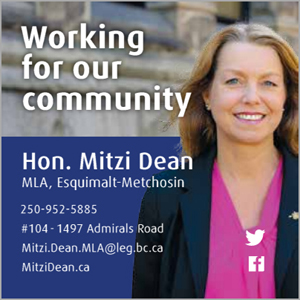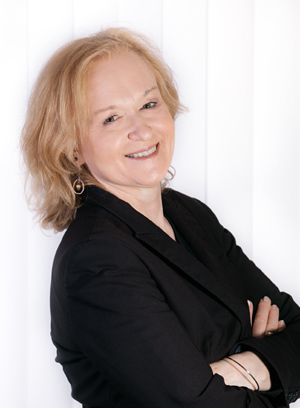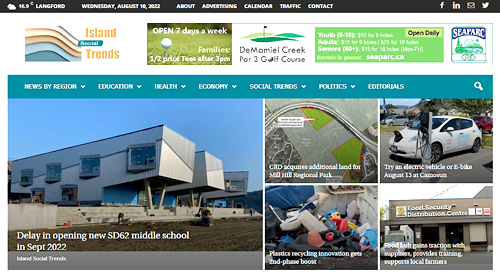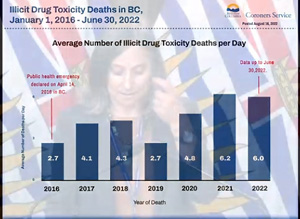
Tuesday August 16, 2022 | VICTORIA, BC [Last update: 7:10 pm]
by Mary P Brooke, B.Sc. | Island Social Trends
BC Chief Coroner Lisa Lapointe released the latest statistics for deaths due to the use of toxic illicit drugs.
In delivering her report Illicit Drug Toxicity Deaths in BC (January 1, 2012 to June 30, 2022) Lapointe emphasized that the deaths in her report did *not* include deaths related to the use of medically-prescribed opioids (though those drugs can be obtained illegally ‘on the street’).
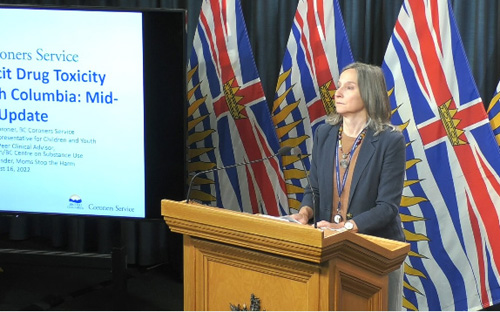
This year to date (June 30, 2022) there have been 1,095 deaths in BC due to unintentional illicit drug toxicity. That’s the highest number ever recorded in the first six months of a calendar year in BC.
There have now been 10,000 deaths recorded in BC since the declaration of the drug toxicity crisis in 2016.
Lapointe says that compassionate leadership will make a difference going forward. That includes attentive interpretation of the deaths stats and connecting that to how people can be helped in the community, Lapointe summarized at the end of today’s media session.
She pointed out the good work of today’s speakers: Jennifer Charlesworth, BC’s representative for children and youth; Guy Felicella, peer clinical advisor, Vancouver Coastal Health and BC Centre on Substance Use; and Leslie McBain, co-founder, Moms Stop the Harm.
Public education for youth:
Youth need “alternate ways to deal with their troubles” and “how not to get involved (with drugs),” said Dr Jennifer Charlesworth, BC Government Rep, Children & Youth, during today’s BC Coroner’s media session on the (still high) latest illicit drug toxicity deaths in BC.
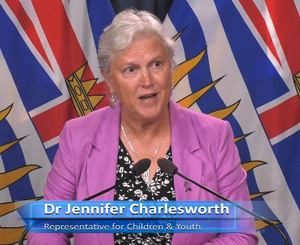
Today Charlesworth highlighted that of the “staggering” number of deaths reported (1,095 deaths setting a new record for the number of deaths in the first half of the year), 16 of those were among youth under the age of 19 years of age, and 140 of the deaths were in people age 19 to 29.
She thanked BC Coroner Lisa Lapointe for delivering the toxic drug death information with “compassion and care”.
“Children and youth are both directly and indirectly agfectd to a degree that many are unaware,” said Dr Charlesworth. The drug crisis is urgent for young people, she said, within a remark that it’s her duty to inform the public and the government “how urgent the drug crisis is and how deep the harms go”. She said there is “an urgent need for action”.
“This is not an adult-only problem,” said Charlesworth, calling it “an enormous and persistent issue that we see come repeatedly — daily, in fact” in her office.
When invited to schools in BC, Charlesworth says “students are really interested in this” as “they know people who’ve died from illicit drug toxicity”. It speaks to a need for better ways to address life stressors and mental health issues.
“There isn’t very much,” says Charlesworth, regarding public education about illicit drug use and ways to avoid slipping into that.
Speaking about the youth sector, the strategy must be about “developing a robust array of voluntary services and supports to support young people and that included harm reduction,” said Charlesworth today. She says that “the recommendation from 2018 has still not been fulfilled”. But also that “there’s a continual pressure we are bringing to bear, in terms of the number of services that are necessary”.
“There have been some significant steps and some addictions. However, there’s a lack of coordination and lack of continuity of care,” the BC rep says. She remarked on the need for more of that “notion of compassion, respect and regard for youth people and what else is going on in their lives, and what we are seeing is an increasing in an intersecting challenges that young people are facing, exacerbated by COVID for sure, in terms of mental health, disability and substance use.”
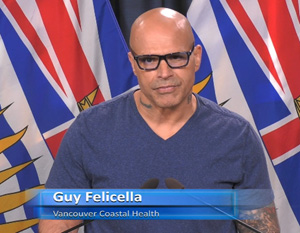
Those are really tough issues to address. But it’s not without the possibility of doing something, and we’re concerned there hasn’t been that type of effort put toward addressing the multiplicity of needs that young people have.
Same place as six years ago:
These drugs are dangerous for one-time users. “It’s so unpredictable – not knowing what you’re consuming. It might look and taste the same, but isn’t the same until after you use it,” says Guy Felicella, clinical advisor, Vancouver Coastal Health and BC Centre on Substance Use, who spoke at the BC Coroner’s press conference today.
He laments that the drug overdose crisis “is in the same place as it was six years ago”. The opioid drug overdose crisis was first declared as a public health emergency in BC in 2016, by the Public Health Officer at the time.
“The unregulated drug supply has gotten worse,” Felicella said today during the press conference.
Most deaths among men:
Last year it was clearly identified that the highest number of illicit drug-related deaths occur among adult males up to about the mid-50s range.
Today the BC Coroner pointed out that the average age of those who die from illicit drug toxicity is 44. In 2022, 73% of those who died were ages 30 to 59, and 78% were male.
Construction sector:
One in five who die in BC from drug overdose are construction workers, said Felicella today. He says there are “policies that continue to to prevent people” from getting the help they need.
In January of this year, the Vancouver Island Construction Association (VICA) received $1 million from the BC Government to support their Tailgate Toolkit on-site education program among construction workers.
“We are continually seeing more recognition from the industry and the devastation that the poisoned illicit drug supply is taking on our communities,” says Rory Kulmala, Chief Executive Officer, VICA. “Through our Tailgate Toolkit Program, we have delivered on-site ‘toolbox talks’ to over 2,150 industry members across British Columbia. Further, we have delivered our Supervisor Training course to site leaders, equipping them with the tools needed to discuss and address substance use and mental health within their workforce,” the VICA CEO told Island Social Trends today.
“Today’s Coroner’s Report reflects the reality of the poisoned drug supply,” said Kulmala. “Men, primarily, are dying alone, but when harm reduction measures are taken (supervised consumption, safe supply) there wasn’t a recorded death. We will continue to advocate to the best of our ability harm reduction measures and inform our industry of the supports available to keep our employees safe,” he said today in a statement.
Apart from the Tailgate Toolkit initiative (funded from VICA’s other revenue streams), one example of a current support is a course that VICA is offering online called “Significant changes and what they mean for you” (a 2-hour course being offered August 17 and October 5), free for VICA members (or otherwise $99.99+tax). They also help promote local events like sports matches, as ways for their worker-community to get involved and find other entertainment outlets.
Drug-overdose deaths continue:
In BC, the number of deaths due to illicit drug toxicity overall in the first six months of 2022 have “accelerated”, reported BC Chief Coroner Lisa Lapointe today. Though in the month of June 2022 the 146 reported deaths reveal a decrease of 17% compared to June of last year, and a 26% decrease compared to the previous month of May 2022.
Digging deeper into the numbers, it appears the rate of increase in toxic drug-related deaths in 2022 is, so far (by Health Authority) greater on Vancouver Island than in Lower Mainland and Northern BC communities. [See Table 12, above]
Correlation to low-income, or cost of living pressures:
The data is implying a direct correlation to insufficient income and life supports, in that there’s a chart showing the correlation of the date when BC government income supports are issued and the increase in toxic drug-related deaths.
Ideally this does not lead to any policy-driven decrease in income supports; to the contrary — if people jump at the opportunity to buy drugs when a bit of extra cash rolls in, then the underlying problem is having not enough money for life sustainability to begin with.
The highest number of illicit drug toxicity deaths in 2022 to date are seen in Vancouver, Surrey and Greater Victoria — which also happen to be the areas with the highest-density populations and highest costs of living (notably housing).
Deaths mostly happen indoors:
The Coroner pointed out today that 84% of the illicit drug toxicity deaths in BC occurred indoors: 56% in private residences and 27% in other indoor places such as social and supportive housing, SROs, shelters and hotels).
No deaths have been reported at supervised consumption or drug overdose prevention sites, today’s report noted.
===== ABOUT THE WRITER:
Mary P Brooke, B.Sc. is the editor and publisher of Island Social Trends. She has been reporting on news of the west shore and south Vancouver Island since 2008 (MapleLine Magazine 2008-2010, Sooke Voice News 2011-2013, West Shore Voice News 2014-2020, Island Social Trends 2020 to present).
Within the realm of health reporting, Ms Brooke covered virtually every COVID-19 media session by Dr Bonnie Henry and Health Minister Adrian Dix, and wrote daily on the pandemic from early 2020 into spring 2022 [see COVID news archive]. She also covers the news of Island Health.
Mary P Brooke has reported on education in the west shore (Sooke School District SD62) at the board and committee level since 2014. [See SD62 news archive]










